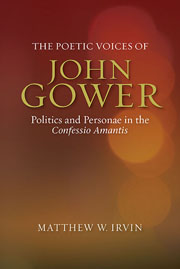Book contents
- Frontmatter
- Contents
- Dedication
- Acknowledgements
- List of Abbreviations
- Introduction: Making and Doing Love
- 1 The Inheritance of the Confessio Amantis
- 2 The Orientation of the Prologue to the Confessio Amantis
- 3 Amorous Persons
- 4 Pity and the Feminine
- 5 Labor and Art
- 6 Alienation and Value
- 7 The Love of Kings
- Conclusion: Identifying Amans
- Bibliography
- Index
- VOLUMES ALREADY PUBLISHED
1 - The Inheritance of the Confessio Amantis
Published online by Cambridge University Press: 05 March 2014
- Frontmatter
- Contents
- Dedication
- Acknowledgements
- List of Abbreviations
- Introduction: Making and Doing Love
- 1 The Inheritance of the Confessio Amantis
- 2 The Orientation of the Prologue to the Confessio Amantis
- 3 Amorous Persons
- 4 Pity and the Feminine
- 5 Labor and Art
- 6 Alienation and Value
- 7 The Love of Kings
- Conclusion: Identifying Amans
- Bibliography
- Index
- VOLUMES ALREADY PUBLISHED
Summary
In her Studies in John Gower, Maria Wickert argues that “the problem of self-knowledge … is the central problem of Gower's three major works and it, more than anything else, unites the Mirour, [the Vox Clamantis], and the Confessio.” This self-knowledge is the philosophical ground for Gower's entire poetry. It requires the intellectual virtues, especially those of prudence and art, for the self that Gower investigates is a self that acts and creates amidst contingency. It is therefore a political and moral self, one that comes to self-knowledge through knowing its duties and rights, one that is subject to laws: in the terminology of medieval law, it is a “persona.” Knowing oneself is knowledge of what one should do, how one should act (that is, “prudence”), in the context of one's relations to other individuals and to the common good. By making fictional poetic personae (that is, “art”), Gower gives his readers the opportunity to experience the pleasures and pains that make self-knowledge so problematic, and through that experience acquire better moral habits. After all, especially amidst the affects and passions of love, self-knowledge and self-delusion can seem the same. Gower's poetry works through both prudence and art, so that through poetic personae, readers discover the propriety and decorum that produce the pleasure of peace and joy, in poems and in politics. To explain how Gower creates these complex personae, I will look first at one of Gower's sources for Aristotelian thought, Brunetto Latini's Li Livres dou Tresor, the thirteenth-century French compilation of philosophical work.
- Type
- Chapter
- Information
- The Poetic Voices of John GowerPolitics and Personae in the Confessio Amantis, pp. 7 - 45Publisher: Boydell & BrewerPrint publication year: 2014



